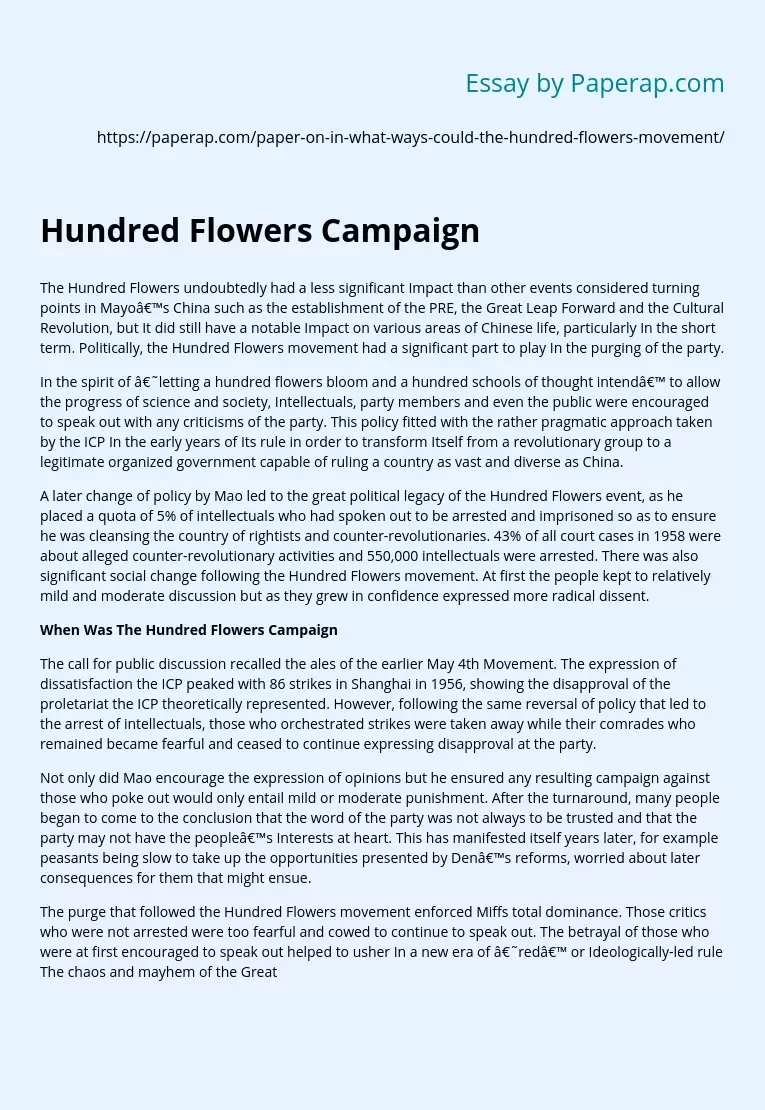The Hundred Flowers Campaign
The Hundred Flowers undoubtedly had a less significant impact than other events considered turning points in Mayo’s China such as the establishment of the PRE, the Great Leap Forward, and the Cultural Revolution, but It did still have a notable impact on various areas of Chinese life, particularly In the short term. Politically, the Hundred Flowers movement had a significant part to play In the purging of the party.
In the spirit of ‘letting a hundred flowers bloom and a hundred schools of thought intend’ to allow the progress of science and society, Intellectuals, party members, and even the public were encouraged to speak out with any criticisms of the party. This policy fitted with the rather pragmatic approach taken by the ICP In the early years of Its rule in order to transform Itself from a revolutionary group to a legitimate organized government capable of ruling a country as vast and diverse as China.
A later change of policy by Mao led to the great political legacy of the Hundred Flowers event, as he placed a quota of 5% of intellectuals who had spoken out to be arrested and imprisoned so as to ensure he was cleansing the country of rightists and counter-revolutionaries.
43% of all court cases in 1958 were about alleged counter-revolutionary activities and 550,000 intellectuals were arrested. There was also significant social change following the Hundred Flowers movement. At first, the people kept to relatively mild and moderate discussion but as they grew in confidence expressed more radical dissent.
The call for public discussion recalled the ales of the earlier May 4th Movement.
The expression of dissatisfaction with the ICP peaked with 86 strikes in Shanghai in 1956, showing the disapproval of the proletariat the ICP theoretically represented. However, following the same reversal of policy that led to the arrest of intellectuals, those who orchestrated strikes were taken away while their comrades who remained became fearful and ceased to continue expressing disapproval at the party.
Not only did Mao encourage the expression of opinions but he ensured any resulting campaign against those who poke out would only entail mild or moderate punishment. After the turnaround, many people began to come to the conclusion that the word of the party was not always to be trusted and that the party may not have the people’s interests at heart. This has manifested itself years later, for example, peasants being slow to take up the opportunities presented by Den’s reforms, worried about later consequences for them that might ensue.
The purge that followed the Hundred Flowers movement enforced Miff’s total dominance. Those critics who were not arrested were too fearful and cowed to continue to speak out. The betrayal of those who were at first encouraged to speak out helped to usher In a new era of ‘red’ or Ideologically-led rule The chaos and mayhem of the Great Leap Forward followed, which Mao may not have been able to implement without the conformity and lack of opposition that resulted as a legacy of the Hundred Flowers. While not a major turning point, the Hung area Flowers allow EAI Mao to carry on Walt later, more gallantly polices.
The Hundred Flowers Campaign. (2019, Dec 05). Retrieved from https://paperap.com/paper-on-in-what-ways-could-the-hundred-flowers-movement/

